Cats, known for their aloof and independent nature, have long been the subject of debate among pet owners and animal behaviorists alike about their empathy capabilities. One question that frequently piques curiosity is whether cats can sense when you’re shedding tears. This paper seeks to explore the captivating topic of feline emotional intelligence and their remarkable aptitude for detecting human distress. By delving into scientific studies, anecdotal evidence, and expert opinions, we aim to provide a comprehensive understanding of this intriguing phenomenon.
How Can Cats Sense Human Emotions?
Cats, like other pets, possess a remarkable ability to observe and pick up on subtle cues in the behavior, body language, and vocal tones of their human companions. Studies suggest that cats may link certain changes in behavior, such as crying or speaking loudly, with negative emotions.
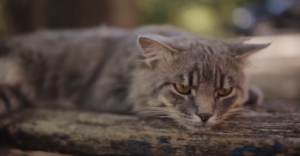
Your Scent
Cats possess an extraordinarily keen sense of smell, surpassing that of humans in strength and acuity. This enables them to perceive subtle shifts in their surroundings, such as variations in their owner’s fragrance.
However, it is crucial to acknowledge that although they may perceive a shift, discerning the exact emotion of sadness or identifying crying is considerably more uncertain.
Your Face
Cats can also perceive human emotions by observing facial expressions. Cats pay close attention to their humans’ faces. There’s evidence suggesting that they can read certain facial cues, including those related to distress or unhappiness. A study in ‘Animal Cognition’ found that cats responded differently to their owners’ smiles and frowns. When the owner frowned, the cats were more likely to exhibit comforting behaviors like purring or rubbing against their owners. However, it’s crucial to remember that this doesn’t necessarily mean cats understand the concept of human crying or sadness. They might simply associate certain facial expressions with specific responses or outcomes. [1]
Your Voice
Cats are quite responsive to the tone and volume of human voices, an attribute that might play a role in their ability to perceive emotional states. When you’re upset and crying, your voice may quiver, change in pitch, or become louder, signaling to your cat that something is different. A study published in ‘Behavioural Processes’ showed that cats can distinguish their owners’ voices from those of strangers, which implies that they are attuned to variations in familiar voices. However, just as with facial expressions and scent changes, it’s still unclear whether cats can truly comprehend or empathize with the sadness inherent in the sound of human crying. What is clear, though, is their ability to recognize a change, which might prompt them to behave differently.
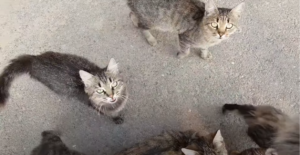
Do Our Emotions Affect Cats?
Our emotions, particularly those that result in noticeable physiological changes or altered behavior, could indeed have an impact on our cats. Cats are highly sensitive creatures and are often attuned to the emotional climate of their environment. When their human companions are stressed or upset, cats might perceive the elevated tension and respond accordingly. Some might display comforting behaviors or become more clingy, while others might become anxious themselves. This is known as emotional contagion or mirror-stress, a phenomenon that’s been observed in various animal species. A study published in ‘PLOS One’ discovered that cats living with neurotic owners had a higher chance of exhibiting stress-related behaviors themselves such as excessive grooming or aggression. This suggests a potential correlation between human distress and feline behavior. [2]
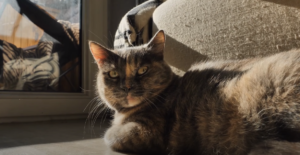
What Might Your Cat Do When They Know You Are Sad?
Cats’ reactions to their human’s sadness can vary greatly depending on their personalities, their relationship with the human, and their past experiences.
Spend More Time Around You
Similar to other pets, cats may respond to their owner’s sadness by seeking more companionship and spending increased time in their presence. They might lay next to their owner, follow them around the house, or even nestle in their lap. Felines that aren’t typically lap cats might still choose to stay nearby, possibly sitting nearby or keeping a watchful eye from a distance. This behavior could be a manifestation of their innate territorial instincts, symbolizing protection, or it could simply be a response to the change in their owner’s demeanor. However, it’s important to remember that every cat is different and responses may vary widely based on the individual cat’s temperament and relationship with their owner. As such, an increase in their time spent near their human might be one potential indicator of a cat’s recognition of their owner’s distress, but it should not be considered a definitive or universal sign.
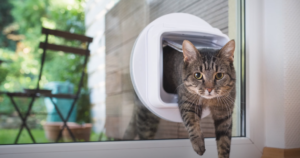
Comfort You
Numerous owners of cats have shared accounts of their feline companions providing solace during moments of emotional distress. This comforting behavior might include more frequent purring, gentle head-butting, kneading, or even licking their owner. Purring is particularly interesting as it’s not just a sign of contentment but has been suggested to have healing properties due to the frequency at which cats purr. Some owners may find their cat’s purring or steady presence soothing, providing a sense of companionship and emotional support during difficult times. However, this behavior is largely subjective and differs from cat to cat, and person to person. It’s key to remember that while these behaviors might provide comfort to us, it doesn’t necessarily mean our cats have a comprehensive understanding of human emotions. They might simply be responding to changes in our behavior, scent, or voice, and acting in a way that has previously brought positive reinforcement. [3]
Ignore You
Contrary to expectations, some cats may appear to ignore their owners when they are distressed. This could manifest in behaviors such as turning away, leaving the room, or not responding to their owner’s calls. In such cases, it’s crucial not to interpret this as a lack of empathy or concern on your cat’s part.
However, this behaviour, like all others, will vary widely based on an individual cat’s personality and past experiences. Therefore, while a cat’s apparent indifference might be disheartening to some, it is just another potential response to their owner’s emotional state and does not necessarily indicate a lack of awareness or attachment.
Avoid You
In certain instances, cats may react to their owner’s emotional distress by deliberately keeping their distance. This behavior could be exhibited through actions such as retreating to a secluded area of the house, avoiding physical contact, or displaying signs of unease or agitation when near their distressed owner. This avoidance could be a cat’s way of self-regulation, as they may feel overwhelmed by the unfamiliar or heightened emotional atmosphere. It could also be a response rooted in past experiences where similar emotional expressions in their owner resulted in negative outcomes for the cat. Although it may appear unsympathetic, it is crucial to bear in mind that cats, much like humans, possess their own distinct mechanisms for coping with and reacting to stressors. This avoidance behavior doesn’t necessarily mean your cat is uncaring—it may simply be their instinctive way of managing the situation.
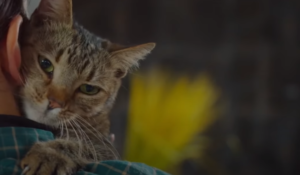
Try To Distract You
Cats may instinctively attempt to distract their owners from their distress by initiating play or displaying behaviors that typically grab their owner’s attention. For instance, they may bring a favorite toy for a game of fetch, perform endearing antics, or start exploring areas they know they aren’t supposed to, knowing it usually gets a reaction from their human. While it’s uncertain whether cats consciously aim to distract their owners from their sorrow, this behavior could be a response to the change in their owner’s demeanor, an attempt to reestablish normalcy, or a way to engage their owner in an activity that usually results in positive interaction. As with other behaviors, it’s important to remember that this is not a universal reaction and can vary greatly depending on the cat’s personality and relationship with its owner. [4]
Does Owning A Cat Help When We Are Sad?
Owning a cat can indeed help when we are feeling sad. Cat owners often report feelings of comfort, love, and companionship that help to alleviate negative emotions. The act of stroking a cat releases endorphins in the brain, which are known as “feel good” chemicals that can boost mood and reduce feelings of sadness. Moreover, the routine of caring for a feline friend — feeding them, grooming them, and playing with them — can provide a sense of purpose and a distraction from negative thoughts. In fact, studies have shown that the frequency of a cat’s purr has therapeutic effects, potentially promoting the healing of bones and reducing stress and anxiety. However, it’s important to note that while cats can offer emotional support, they cannot replace professional help if sadness becomes persistent or debilitating. [5]
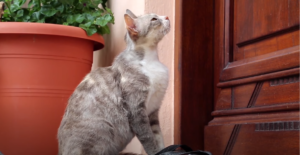
FAQ
How does my cat feel when I cry?
While it’s challenging to definitively determine how cats feel when their owners cry, some evidence suggests that cats can pick up on human emotions. When you cry, your cat may become more alert and concerned, reacting to the sound of your sobbing and your emotional state. Some cats may comfort their crying owners, while others may show signs of stress and choose to retreat. Moreover, certain cats may display indifference and show little response to their owner’s emotional expressions. It’s crucial to keep in mind that cats, like people, have individual personalities and reactions, and these responses can vary greatly.
Does my cat know why I’m crying?
It’s currently impossible to know definitively whether cats understand the specific reasons behind human emotions such as crying. While dogs may respond to physical cues associated with crying, such as changes in tone of voice or body language, they likely don’t fully grasp the complex emotional reasons behind human tears. Keep in mind, cats primarily communicate nonverbally, and their cognitive processes are different from ours. While they are sensitive to their environment and can pick up on different moods and tension, it’s a leap to say they comprehend the nuances of human emotions or the specific circumstances causing them. However, your cat may still react to your crying, providing comfort, keeping distance, or exhibiting curiosity based on their unique personalities and experiences.
Do cats know when you’re hurt?
Yes, cats often demonstrate an awareness when their owners are physically hurt. They can pick up on changes in behavior, scent, or body language that indicate discomfort or pain. For instance, if you have recently undergone surgery or have an injury, a cat may show increased attention towards you or the afflicted area. Some cat owners report their cats acting more affectionate or protective when they are unwell, while others may notice their cats maintaining a respectful distance. However, it’s important to note that these behaviors are subjective and can differ significantly from one cat to another. Just as with emotional distress, a cat’s response to physical pain in their humans can vary greatly depending on their personality and relationship with the owner. Cats are not medical professionals, and while their companionship can provide comfort during times of physical pain, it’s crucial to seek proper medical attention as needed.
What do cats think when you cry in front of them?
While it’s challenging to understand exactly what cats think when their owners cry, research suggests that they can perceive changes in mood and behavior. Cats, being highly perceptive creatures, can detect shifts in your tone of voice, body language, or overall demeanor, signaling that something may be wrong. They may then react in various ways based on their individual personalities and experiences. Some may express concern or curiosity, while others can become anxious or show indifference. Remember, although cats possess a keen sense of their environment and can respond empathetically to their owners, they don’t possess a human-like understanding of emotions. Thus, their responses to their owners crying are likely more instinctual rather than a comprehension of the situation’s emotional complexities.
Why does my cat get mad when I cry?
Cats possess a remarkable sensitivity to changes within their surroundings, including fluctuations in their owner’s emotional state. When you cry, your cat may interpret your emotional display as disruptive or unsettling, leading to a reaction that might seem like anger or annoyance. Changes in your tone of voice, body language, or overall behavior can induce feelings of anxiety, confusion, or threat in your feline companion. Hence, they may respond by showing signs of aggression like hissing, swatting, or retreating to create distance. However, it’s essential to remember that this behavior is not necessarily indicative of anger in the same way humans experience it. Instead, it’s more likely a reflection of their discomfort with the disruption in their environment. Remember, every cat has a unique personality and reaction to stimuli, and their responses can greatly differ. Therefore, it’s crucial to observe your cat and understand their specific reactions rather than assuming they are mad or upset.
Do cats understand when you kiss them?
The concept of kissing is not naturally understood by cats in the same way it is by humans. Cats do not typically display affection through kissing. Instead, cats communicate through various forms of body language, such as rubbing against each other, purring, or engaging in grooming behaviors. When a human kisses a cat, the cat may not understand this action as a sign of affection. They may tolerate it, especially if they are used to such interaction from a young age. Certain felines may even relish the intimate physical connection. On the other hand, some cats may perceive this intrusion into their personal space as a threat or source of discomfort. It is always important to pay attention to your cat’s reactions and respect their boundaries. Remember, just because we perceive kissing as a sign of affection does not mean cats understand it in the same way. It’s crucial to communicate with your cat through their preferred means of communication to establish and maintain a strong bond. Overall, while cats may not comprehend the exact reasons behind human emotions or actions like kissing, they possess a strong sensitivity to their environment and can respond in various ways based on their unique personalities and experiences. As responsible pet owners, it’s important to observe and understand our cats’ behaviors and preferences to maintain a healthy and harmonious relationship.
Do cats know they’re cute?
While it’s a charming thought, there’s no scientific evidence to suggest that cats understand the concept of “cuteness” as humans do. Cats do not have a self-awareness of their appearance or possess the human concept of beauty or cuteness. However, cats do learn from experience what behaviors will get them attention or rewards from their owners. If acting “cute” earns them more petting, treats, or playtime, they may continue to exhibit these behaviors. But it’s important to remember this is more about associating actions with positive outcomes, not a conscious understanding that they are being “cute”. Each cat’s behavior can vary greatly depending on their personality and learned experiences. Some cats may be more attention-seeking, while others may prefer to keep their distance. So, while we can certainly find our feline friends adorable and “cute,” it’s not something they are consciously aware of or understand in the same way as humans. Ultimately, cats are unique and complex animals with their own ways of communicating and understanding the world around them.
Why does my cat lick me when I cry?
When tears flow, your feline companion may extend a gentle lick, a gesture of social connection and solace. Cats often groom each other in a behavior known as allogrooming, which is a way of demonstrating trust and care within their social group. If your cat licks you when you’re upset, they might be trying to soothe you in the only way they know how. Additionally, the salty taste of tears might also attract cats, prompting them to lick you. It’s essential, however, to note that every cat is unique and their behaviors can vary greatly. This interpretation of their actions is based on our current understanding of feline behavior, and there’s still much we don’t know about these fascinating creatures. So next time your cat licks you when you’re crying, take comfort in knowing that they are showing their support and care for you in their own unique way. But always remember to seek proper medical attention if necessary and to give your cat the space they need if they seem uncomfortable with the situation.
Useful Video: Does My Cat Know When I’m Sad?
Conclusion
In conclusion, while cats may not fully grasp human emotions like we do, there is evidence to suggest they can sense changes in our mood and behavior. Their responses to these changes are greatly influenced by their unique personalities and experiences. Cats can display concern, curiosity, anxiety, or react in indifferent or aggressive ways. These reactions don’t necessarily indicate a deep understanding of human emotions, but rather instinctual responses to environmental changes. As cat owners, it’s crucial to respect their unique personalities, observe their reactions, and create a positive and comforting environment for them. The bond between a cat and its owner is special and unique, just like the cats themselves.
References:
- https://bettervet.com/resources/pet-lifestyle/do-cats-know-when-you-are-sad#:~:text=Do%20cats%20understand%20when%20you,or%20vocal%20expressions%20during%20crying.
- https://www.dailypaws.com/cats-kittens/behavior/cat-psychology/do-cats-know-when-you-are-sad
- https://basepaws.com/cat-insider/do-cats-know-when-youre-sad
- https://www.thedodo.com/dodowell/do-cats-know-when-you-are-sad
- https://cats.com/do-cats-know-when-you-are-sad

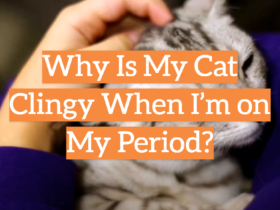
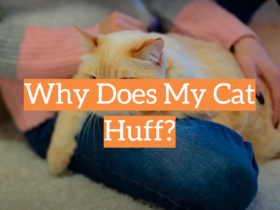
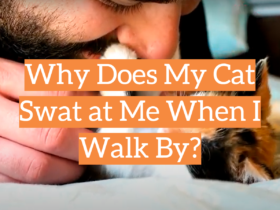
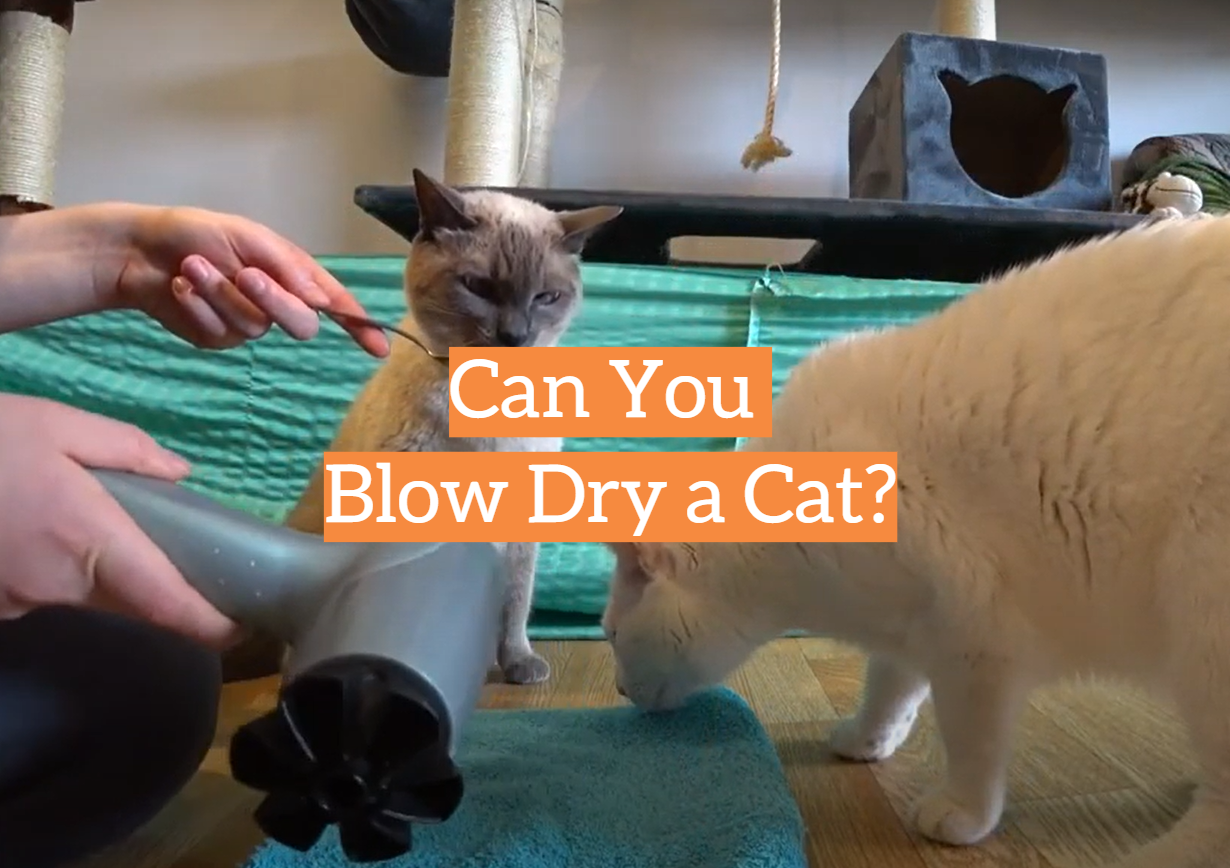
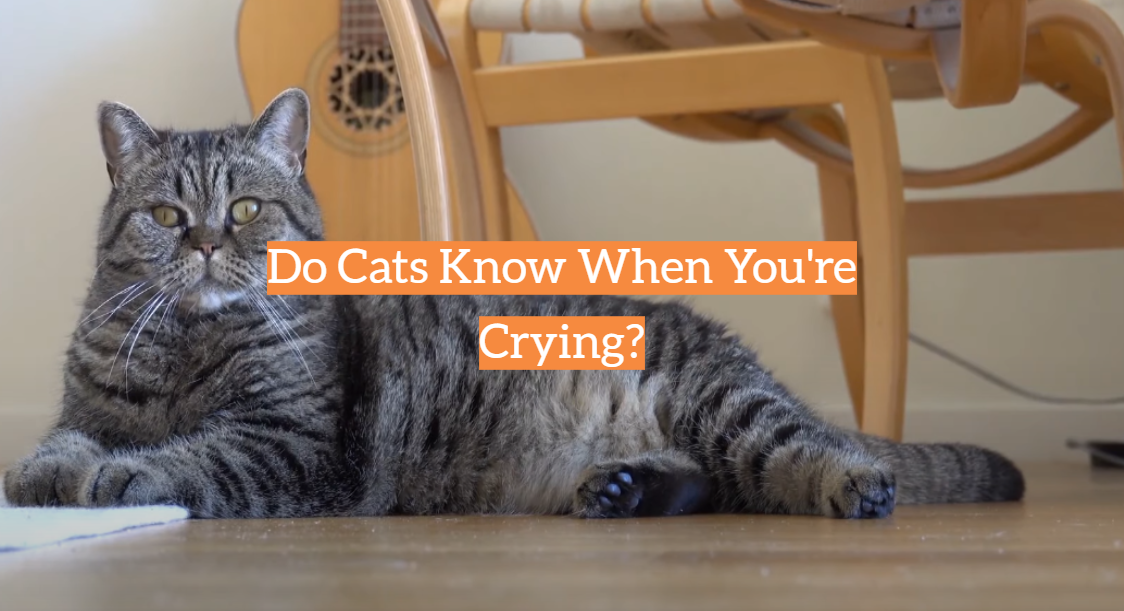


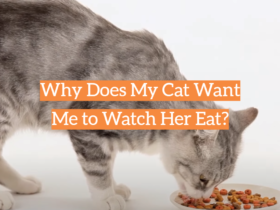

Leave a Reply